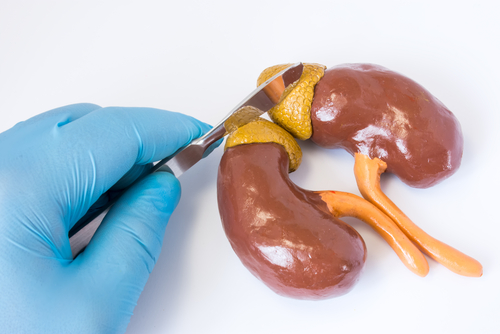Adrenal Surgery Causes Persistent Decrease in Kidney Function in Cushing’s Patients, Study Suggests
Written by |

People with Cushing’s syndrome who undergo surgery to remove one or both adrenal glands experience a persistent decrease in kidney function after one month that does not seem to worsen or improve with time, a study has found.
The study, “Postoperative renal impairment and longitudinal change in renal function after adrenalectomy in patients with Cushing’s syndrome,” was published in the International Journal of Urology.
Cushing’s syndrome is a condition characterized by excess levels of the hormone cortisol in circulation. The condition is the result of prolonged use of glucocorticoid medicines or a tumor that is causing the body to produce too much cortisol.
In about 15% to 20% of endogenous cases, the tumor is located on the adrenal glands, which sit atop the kidneys and are responsible for producing cortisol. The standard treatment is surgery to remove one or both glands, which helps to limit overall cortisol production in these patients.
Adrenal gland removal, a procedure called adrenalectomy, is also the standard treatment for patients who have primary aldosteronism, a condition in which the adrenal glands produce excess amounts of the hormone aldosterone, which can lead to high blood pressure.
A number of recent studies have noted that patients with aldosteronism who undergo adrenal gland removal experience decreased kidney function after the procedure. Researchers, therefore, investigated whether this phenomenon also occurred in Cushing’s syndrome patients undergoing adrenalectomy.
In the study, a team of Japanese researchers examined retrospective data from 35 Cushing’s syndrome and 51 primary aldosteronism patients who underwent surgery between 2004 and 2014 at the Tokyo Medical and Dental University.
To evaluate kidney function, the researchers looked at a measurement called estimated glomerular filtration rate (eGFR), a mathematical formula that assigns a kidney function score based on demographics and the levels of a molecule called creatinine in the blood. Creatinine is filtered out of the blood by the kidneys, so higher levels of creatinine indicate decreased kidney function and a lower eGFR measurement.
eGFR data was collected and calculated for each patient before the surgery, at one, three, and six months after surgery, and then at one year and two years post-surgery.
Researchers found that both Cushing’s and aldosteronism patients had significantly lower eGFR levels one month after surgery (9% lower in Cushing’s and 11% lower in aldosteronism patients), which is indicative of reduced kidney function.
At the remaining follow-up measurement intervals, patients in both groups maintained the same eGFR level that was measured at one month. While patients experienced an initial decrease, kidney function thereafter did not continue to decrease any further.
However, four of the Cushing’s patients (11%) and 12 of the aldosteronism patients (24%) experienced post-operative renal impairment, which is defined as an eGFR decrease of more than 25% from the measurement taken before the operation.
The researchers looked at the group of 16 patients with significant renal impairment for any factors that might have predicted this outcome. They identified high systolic blood pressure in this patient group. Systolic blood pressure (the upper number in blood pressure measurements) represents how much pressure blood is exerting against artery walls when the heart beats.
From these data, the researchers suggested that a phenomenon called glomerular hyperfiltration was taking place: when the kidneys are performing, filtration functions at a higher rate than normal due to elevated hormones. Aldosterone can cause this in aldosteronism patients, and the researchers speculate that cortisol can cause this as well.
Therefore, the kidney damage experienced after surgery might be due to the sudden correcting of the excess filtration that comes from adrenal gland removal. Additionally, higher levels of cortisol could be causing the elevated blood pressure measurement, explaining why the systolic blood pressure was higher in patients who experienced post-operative renal impairment.
Nevertheless, the study determined that Cushing’s patients experience a significant decrease in kidney function following adrenal gland removal.
“In conclusion,” the researchers wrote, “a persistent, but not progressive, significant decrease in eGFR was seen after adrenalectomy in patients with CS [Cushing’s syndrome], as it was reported in patients with [primary aldosteronism].”
The researchers also cautioned that kidney damage may go undetected in Cushing’s patients, and advised doctors to monitor for this possibility.
“Attention should be given to possible masked renal damage in clinical practice for the management of CS,” they wrote.





